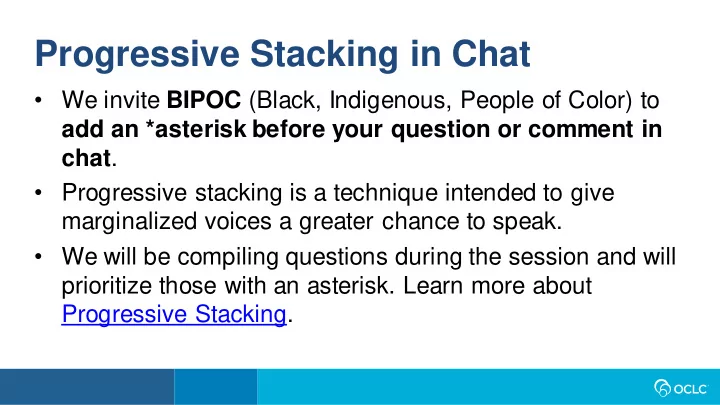

Progressive Stacking in Chat • We invite BIPOC (Black, Indigenous, People of Color) to add an *asterisk before your question or comment in chat . • Progressive stacking is a technique intended to give marginalized voices a greater chance to speak. • We will be compiling questions during the session and will prioritize those with an asterisk. Learn more about Progressive Stacking.
Ekatrina Sotomayor Access Services Assistant, Multnomah County Library, Oregon Amy Honisett Learning and Development Specialist, Multnomah County Library
Acknowledgement of Indigenous land We acknowledge and honor all of ● the original Indigenous peoples of the land upon which Multnomah County Library stands. Visit Native Land Digital to ● acknowledge territories local to your area.
Strengthen Equity, Diversity, and Inclusion Practice Through Self-Paced Learning Amy Honisett - Learning and Development Specialist, Multnomah County Library Ekatrina Sotomayor - Access Services Assistant, Multnomah County Library
Today we will cover… ● How to recognize some of the indications that your organization is ready to support staff with self-paced learning about EDI ● The process staff at Multnomah County Library undertook to develop self-paced learning about EDI ● The benefits of collaboration
Laying the foundation
Making connections Removing barriers Helping meet Honoring the past, for a stronger basic needs embracing the community future Photos: courtesy Multnomah County Library ● We help people better ● We work to provide safe, ● We have books and materials ● We help people learn, create, understand each other and welcoming and clean spaces people want. have fun and understand their respect differences. that serve many different ● We protect freedom of thought world. ● We invest in people who face needs. and expression. ● We connect people to help the greatest barriers in life. ● We create services and ● We use research and solve shared problems. ● We use public resources in ways partnerships that increase community input to shape our ● We help people build trust and that make the greatest impact. personal safety, food security, services and spaces. work toward common goals. health, and access to shelter.
As a result of the COVID-19 pandemic we face profound challenges now and for the foreseeable future. People of color and communities subjected to marginalization are experiencing higher risk and worse outcomes from COVID-19 as a result of systemic inequities. Multnomah County Library will focus library resources on our community’s recovery, starting with those most deeply impacted by the crisis. Equity is at the core of the library’s response, and the priorities below center equity and lived experience. Helping people Supporting Enhancing and Technology Creating and find work and education and diversifying training, access, maintaining safe develop career learning for all virtual services and assistance and healthy skills ages for all spaces
Library staff County population
Share power in hiring process ● Diversity is not and beyond Safe avenues for feedback ● the same as Hiring for inclusivity not only ● diversity (not just entry level) inclusion Opportunities for ● professional development and promotion
Spaces for healing and action Photo: courtesy Multnomah County Library
Photo: courtesy Multnomah County Library MCL equity and inclusion team
Training
Photos: courtesy Multnomah County Library
Photo: courtesy Multnomah County Library
The process
Resources: ● Videos ● Articles Learning styles ● Books ● Podcasts Variety of activities ● Radio news programs
Collaboration
Subject matter experts Lived experience Photo: courtesy Multnomah County Library
Workbook Five - Serving Native American and Alaska Native Communities Conversation starters: resources for reflection ● Who are Indigenous People? ● Who are they not? Replace stereotypes with ● facts. Unpacking common macro & micro aggressions Historical background-and its legacies ● Contemporary Native American issues (self- ● determination, sovereignty, environmental concerns, blood quantum, etc.) Sources and resources for further exploration Photo: courtesy Multnomah County Library ●
Some benefits Empowering staff to connect and ● Equity work challenges us to to learn look at people as individuals, Mitigate a sense of isolation ● not just as members of a group, and can be a catalyst Providing resources for ● for creating community among colleagues to self educate staff members Making the invisible visible ●
● Foundational information ● US history ● Impacts of colonization ● One’s own identities
● History of racism in Oregon ● Bias ● Cross-cultural communication
● History of segregation in libraries ● Additional strategies for communication ● Microaggressions ● Being an active bystander
● For staff of color - Connection, Solidarity and Healing ● For white staff - Addressing Whiteness ● For managers - Guide to Addressing Your Privilege and Power
For staff and management: ● Replace stereotypes with information ● Provide context for issues facing Indian Country today ● Give tools for anti-racist Indigenous collections & programming ● Provide resources for personal exploration
Takeaways
Questions?
Amy Honisett: amyh@multco.us Ekatrina Sotomayor: ekatrinas@multco.us
Recommend
More recommend